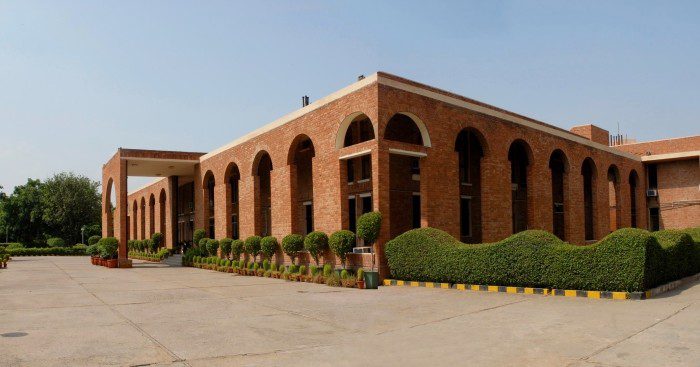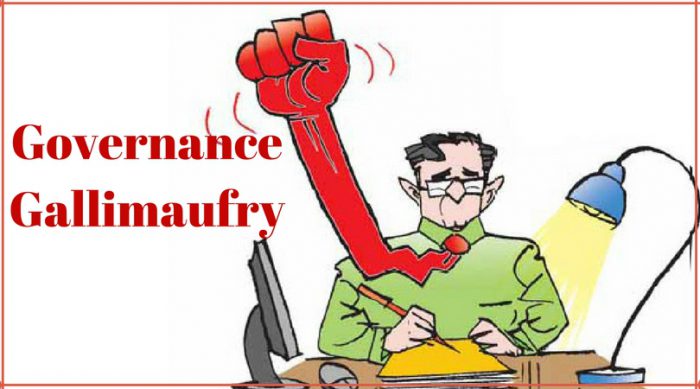Hemashri shares her experience of a training as a bureaucrat that enriched her. She shares her experience, in the weekly column, exclusively for Different Truths.
I was nominated for a training on ‘Good Governance’, in the Management Development Institute (MDI), Gurgaon. I started preparation for the two-week stay in Gurgaon, in 2011. Just two days prior to the departure, a responsible officer called up to inform that since I was the junior-most officer, my name was deleted. I would be accommodated later. I was disheartened. But, the next day, I again received a call from the same officer informing that I was to report for a briefing prior to the training. My nomination was confirmed. Though upset initially, I was happy.
The group of 24 officers landed in MDI Gurgaon. A senior lady officer of the Government of India  delivered an inspiring lecture. Our Course Director was a dynamic retired IAS officer, Dr. Arun Kumar Rath. To date, it’s the most interesting training of my life.
delivered an inspiring lecture. Our Course Director was a dynamic retired IAS officer, Dr. Arun Kumar Rath. To date, it’s the most interesting training of my life.
Dr. Rath had retired as the secretary, education, Government of India. He was a remarkably active academician. His classes were interesting and highly interactive. Prof. Pritam Singh presented his highly illuminating speeches, which exhibited his profound knowledge of scriptures. One day he said, “Big people grow big by making others big and small people grow big by making others small.” This adage was instilled in my psyche, deeply. I have really seen this happening in my life over and over again. I have seen some pompous soul projecting their pathetic self-inadequacy by making others small. There are a few who respect each and every person but they are outnumbered manifold.
In one of his lectures, Prof. Singh asked us, “How many of you have experienced this in life that people whom you help do not even look back at you. This made you crib, ‘I helped him or her so much but see what he or she did to me’.” Many people including me raised hands. The professor added, “Now think of your own life and think of people who helped you. Tell me honestly how many of you have been able to help those people who actually contributed a lot to you or helped generously. Have you been able to return their help or support?” This time there was total silence. The wise professor smiled and said, “Do not worry! This is a harsh fact. Actually, we most often cannot help those who help us. Instead, we help out a different set of people, who may not be able to help you in return. Yet we only talk about those whom we helped and we seldom think or talk about those who helped us. Gratitude decides the altitude in life.” Prof. Singh delivered several lectures and each lecture was full of wisdom.
One of his lectures began, “Have your nourished your constituency? Suppose you feel seriously sick and you need help at midnight hours. How many faces will come to your mind whom you may disturb at such odd, unearthly hours? How many people – friends or relatives you have in your kitty that you may disturb at any odd times? That is your constituency. Bigger the constituency, the more empowered you are to handle life and challenges that life throws at you”. Till this day, his words keep ringing in my mind! What a wonderful way to create awareness about some basic life management techniques.
There was this interesting session on the Lotus Principle of leadership by a learned management guru. To introduce the topic, he asked all trainees to list various uses of lotus and we started to enlist it. Lotus is used to worship Hindu Gods or Goddesses. Some parts of the lotus are eaten, and the list went on. The  professor said lotus remain pure in spite of the muddy surface where it grows. Leaders are like a lotus. Only those who endure extreme adversity and could overcome all hurdles make the finest of leaders.
professor said lotus remain pure in spite of the muddy surface where it grows. Leaders are like a lotus. Only those who endure extreme adversity and could overcome all hurdles make the finest of leaders.
Towards the end of the training session, we had a very unconventional session. One day the instructor divided 24 officers in a group of two and asked us to roam around the campus for half an hour and try to know each other. He asked all of us to share each other’s life stories and instructed us to gather in the same place after half an hour. When we all reported back, the instructor asked us to come to the podium and asked what each member of the two teams had to say. What we appreciated in the person on the podium. The bottom line was that each one had to be sincere and genuine.
I was teamed up with a senior lady know to be a fearless officer. We both spoke about what we liked about each other. The trainer said it was “Appreciative Learning Approach.” In real life, we are often so vocal when we dislike something about a person and we tend to discuss it a lot. When we like or appreciate something in a person, we maintain secrecy and often it is much late or maybe when the person is no more with us that we confess what we liked about that person. Is it not a strange culture, he asked.
We were taught interesting hands-on exercises in team building. Often, in real life, we are so preoccupied in self-glorification that we fail to see the complete picture and we do not bother about bringing out the best as a team. That may be one of the reasons for poor team performance.
Towards the end of the training, we were supposed to make presentations on assigned topics. The group was divided into four teams. A team with relatively younger members took me as a teammate but they did not discuss the topic. On several occasions, I pleaded that we need to start the project. One day, a male member of the team told me that I need not worry about it he will do it for the team. The topic was a very interesting theme, ‘Public-Private Partnership” and as a student of Economics, I was keen to participate. However, I-know-it-all senior declared that it is an irrelevant topic and he instead picks up another. He told in clear terms that I have nothing to do and he will only decide and make the presentation. I told him on the face that I shall not be a silent member of the presentation team. Further, I told him since I am not  wanted so I am leaving the group to work where I am needed. I joined the group of senior officers, who needed someone comfortable with working on the computer. On the day of presentation, we were the second group and our topic was on Civil Services Reforms and Prospects. The team which had declared that I was to be an unproductive member had prepared a rather detailed presentation with no concern for the time limit. Due to the early arrival of the guest speaker, they had to wind up within three minutes and obviously, they could not remould the presentation at such a short notice. Although I was amused to see their condition yet I pretended otherwise.
wanted so I am leaving the group to work where I am needed. I joined the group of senior officers, who needed someone comfortable with working on the computer. On the day of presentation, we were the second group and our topic was on Civil Services Reforms and Prospects. The team which had declared that I was to be an unproductive member had prepared a rather detailed presentation with no concern for the time limit. Due to the early arrival of the guest speaker, they had to wind up within three minutes and obviously, they could not remould the presentation at such a short notice. Although I was amused to see their condition yet I pretended otherwise.
We had to give an assessment of our professors and I had given generous feedback to most of them including Dr. Rath. After nearly six years, one day I received a call from this dynamic professor, who was on a visit to our city. I called on him and had lunch with his team who had come to mentor the first private University of the state.
This was a training which gave me great insight into some golden rules of life, management, teamwork, and a Guru, Dr. Rath.
©Hemashri Hazarika
Photos from the Internet
#Learning #Management #Teamwork #Guru #Professor #GovernanceTraining #DynamicProfessor #GovernanceGallimaufry #DifferentTruths







 By
By
